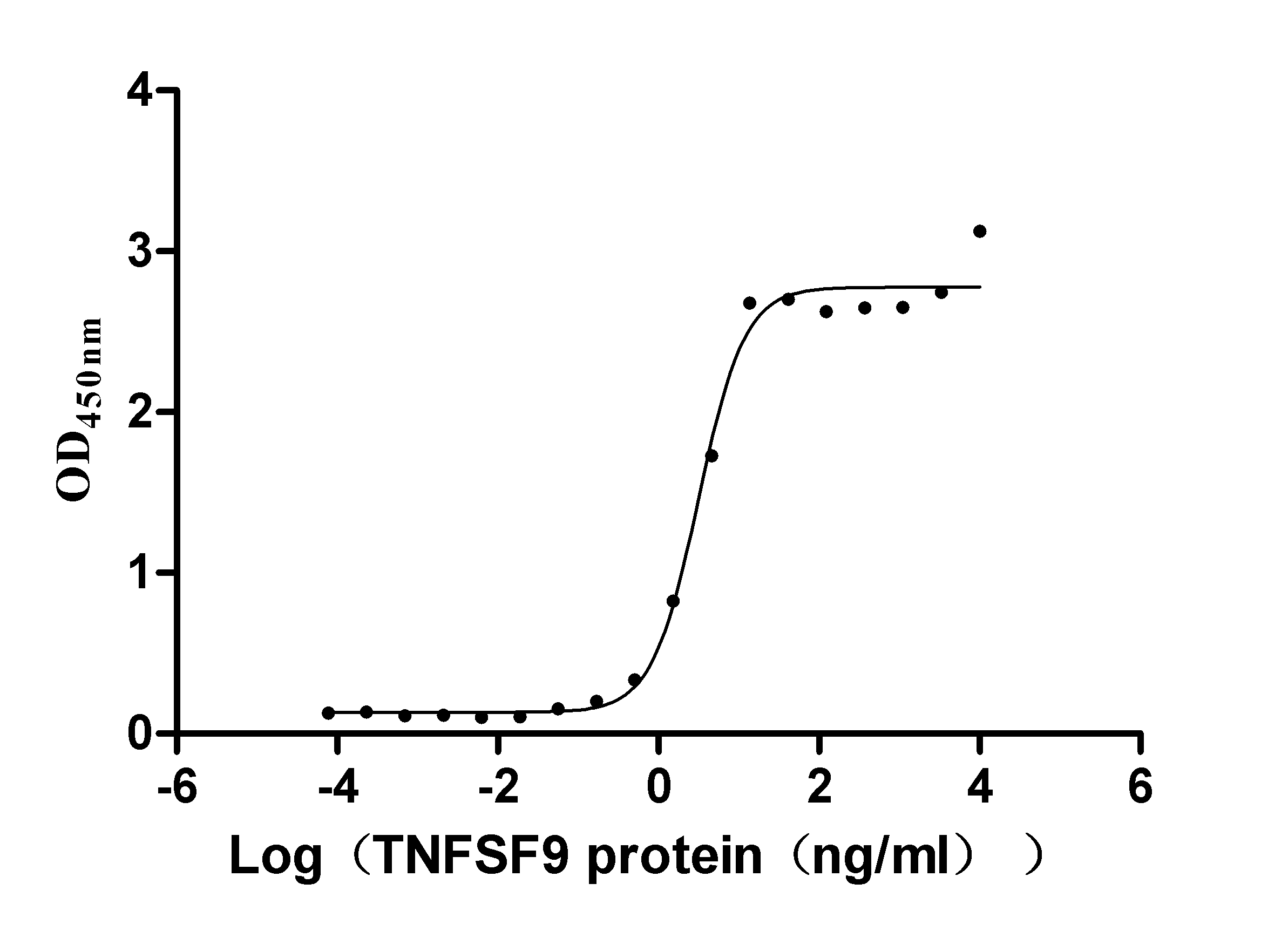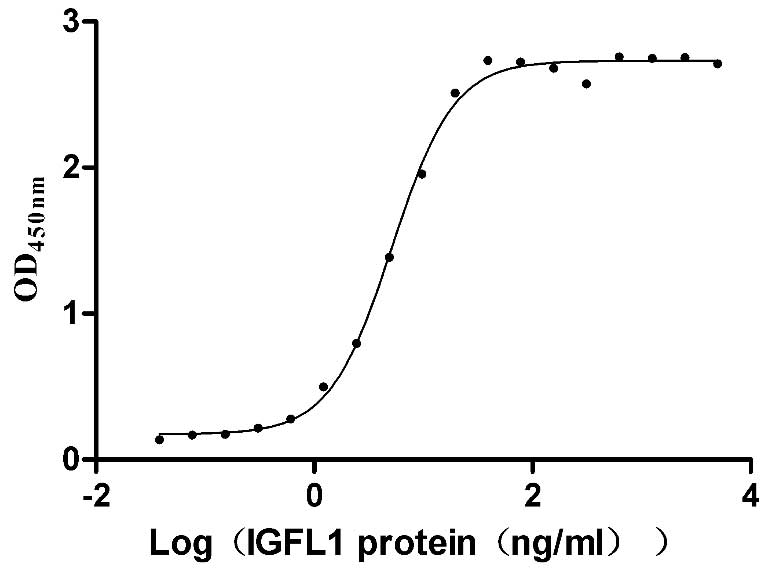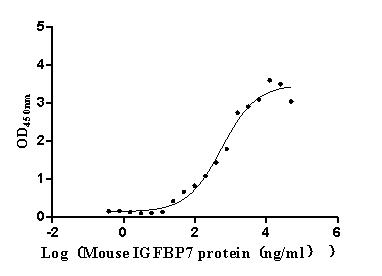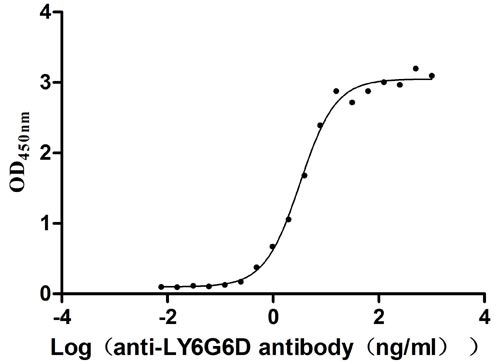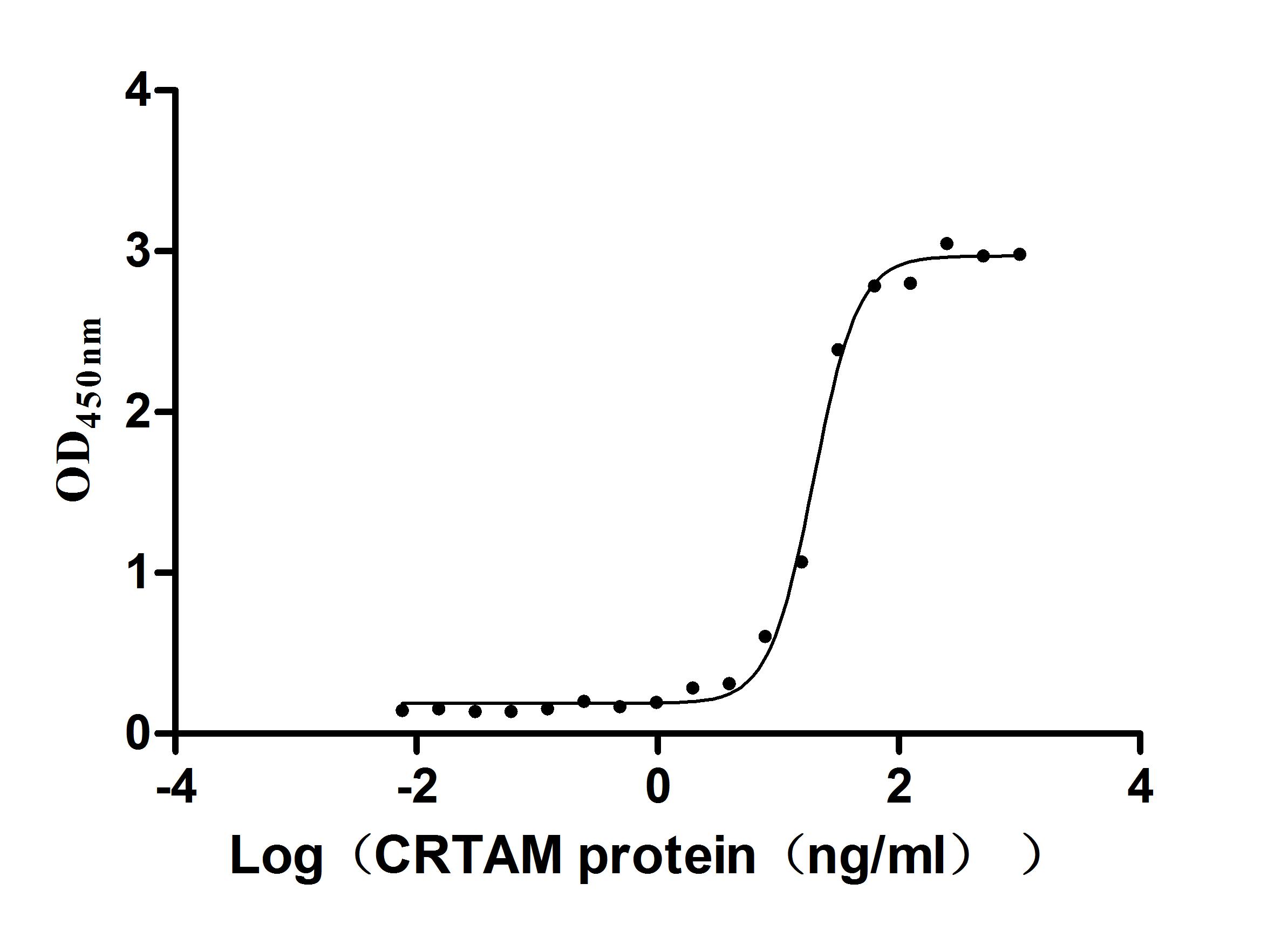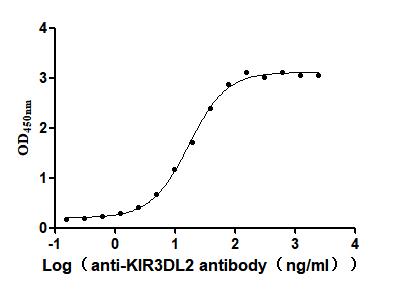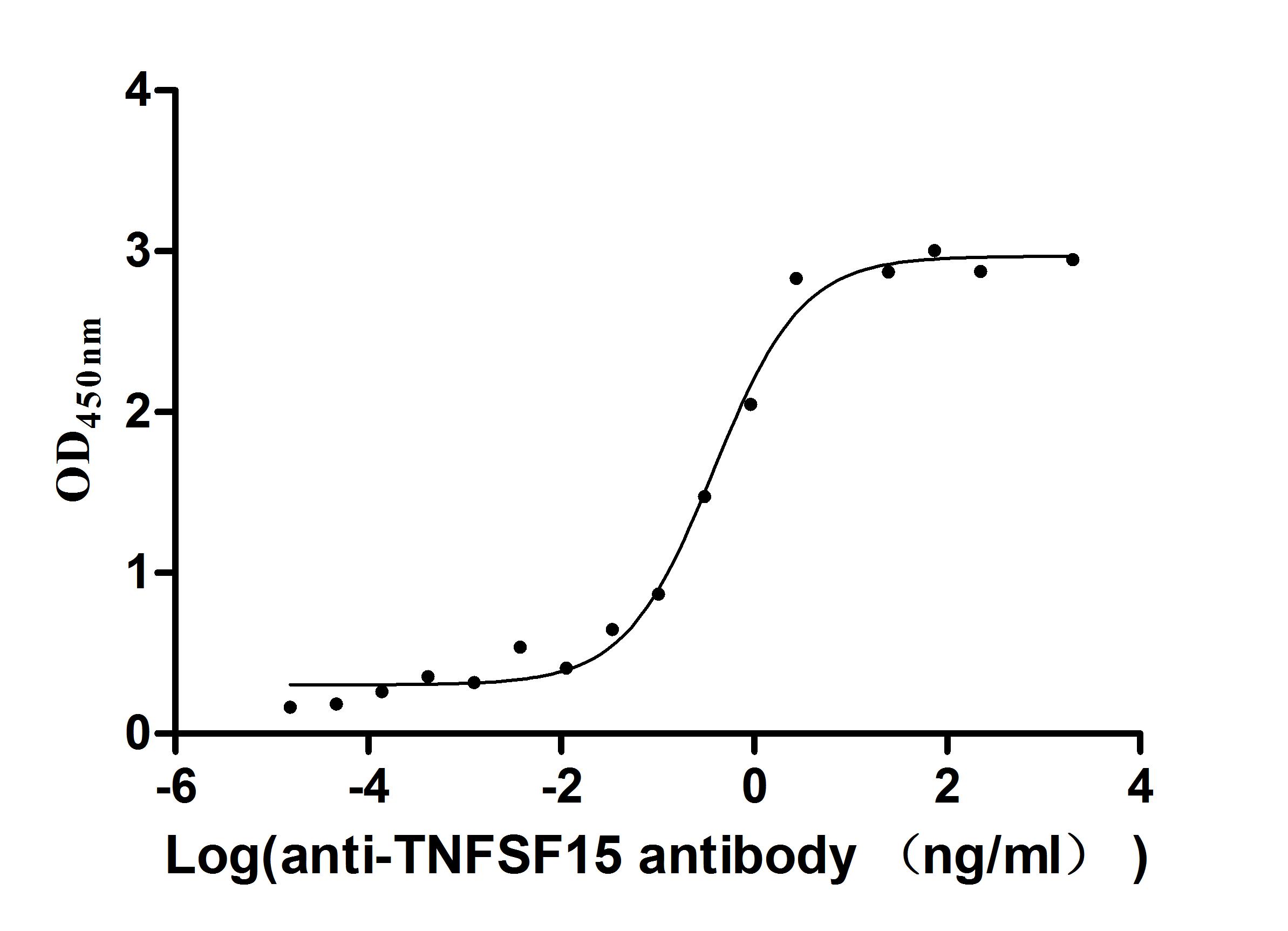Recombinant Mouse Apoptosis regulator Bcl-2 (Bcl2)
-
货号:CSB-CF002611MO(A4)
-
规格:
-
来源:in vitro E.coli expression system
-
其他:
产品详情
-
基因名:
-
Uniprot No.:
-
别名:Bcl2; Bcl-2; Apoptosis regulator Bcl-2
-
种属:Mus musculus (Mouse)
-
蛋白长度:Full length protein
-
表达区域:1-236
-
氨基酸序列MAQAGRTGYDNREIVMKYIHYKLSQRGYEWDAGDADAAPLGAAPTPGIFSFQPESNPMPA VHREMAARTSPLRPLVATAGPALSPVPPCVHLTLRRAGDDFSRRYRRDFAEMSSQLHLTP FTARGRFATVVEELFRDGVNWGRIVAFFEFGGVMCVESVNREMSPLVDNIALWMTEYLNR HLHTWIQDNGGWDAFVELYGPSMRPLFDFSWLSLKTLLSLALVGACITLGAYLGHK
Note: The complete sequence including tag sequence, target protein sequence and linker sequence could be provided upon request. -
蛋白标签:10xHis-SUMO-tag
-
产品提供形式:Liquid or Lyophilized powder
Note: We will preferentially ship the format that we have in stock, however, if you have any special requirement for the format, please remark your requirement when placing the order, we will prepare according to your demand. -
缓冲液:Lyophilized from Tris/PBS-based buffer, 6% Trehalose, pH 8.0
-
储存条件:Store at -20°C/-80°C upon receipt, aliquoting is necessary for mutiple use. Avoid repeated freeze-thaw cycles.
-
保质期:The shelf life is related to many factors, storage state, buffer ingredients, storage temperature and the stability of the protein itself.
Generally, the shelf life of liquid form is 6 months at -20°C/-80°C. The shelf life of lyophilized form is 12 months at -20°C/-80°C. -
货期:Basically, we can dispatch the products out in 1-3 working days after receiving your orders. Delivery time may differ from different purchasing way or location, please kindly consult your local distributors for specific delivery time.Note: All of our proteins are default shipped with normal blue ice packs, if you request to ship with dry ice, please communicate with us in advance and extra fees will be charged.
-
注意事项:Repeated freezing and thawing is not recommended. Store working aliquots at 4°C for up to one week.
-
Datasheet & COA:Please contact us to get it.
相关产品
靶点详情
-
功能:Suppresses apoptosis in a variety of cell systems including factor-dependent lymphohematopoietic and neural cells. Regulates cell death by controlling the mitochondrial membrane permeability. Appears to function in a feedback loop system with caspases. Inhibits caspase activity either by preventing the release of cytochrome c from the mitochondria and/or by binding to the apoptosis-activating factor (APAF-1). Also acts as an inhibitor of autophagy: interacts with BECN1 and AMBRA1 during non-starvation conditions and inhibits their autophagy function. May attenuate inflammation by impairing NLRP1-inflammasome activation, hence CASP1 activation and IL1B release.
-
基因功能参考文献:
- data demonstrate that disruption of the beclin 1-BCL2 complex is an effective mechanism to increase autophagy, prevent premature ageing, improve healthspan and promote longevity in mammals PMID: 29849149
- Results support a link between age-related apoptosis in auditory cortex neurons and miR-34a/Bcl-2 signaling, which may serve as a potential mechanism of the expression of age-related hearing loss in the auditory cortex. PMID: 28817812
- MiR-146a inhibits proliferation and induces apoptosis in murine osteoblastic MC3T3-E1 by regulating Bcl2 PMID: 28975995
- Ru(II)/diphenylphosphine/pyridine-6-thiolate complexes induce S-180 cell apoptosis through intrinsic mitochondrial pathway involving inhibition of Bcl-2 and p53/Bax activation. PMID: 28795366
- The results suggest that SPK2 interacts with Bcl2 via its BH3 domain, thereby dissociating it from Beclin-1 and activating autophagy while protecting neurons against ischemic injury. PMID: 28682313
- The findings support a model in which survival is determined by quantitative participation of multiple anti-apoptotic proteins, BCL2, Mcl1, and BCL2A1, rather than by a single anti-apoptotic protein. PMID: 28362427
- Bcl-2 is strongly expressed in the inner hair cells and spiral ganglion neurons of young mice. In addition, moderate Bcl-2 expression is also detected in the outer hair cells and in the neurons of the auditory cortex. A significant reduction of Bcl-2 expression in the cochlea or auditory cortex is also associated with elevated hearing thresholds and hair cell loss during aging. PMID: 27925611
- Bcl2 is the autophagy-related target of miR-449a. PMID: 27351886
- anti-apoptotic molecules BclxL and Bcl-2 and the pro-apoptotic factors BAD and BID cooperate to promote migration of triple-negative breast cancer cells stimulated with cl-CD95L. PMID: 27367565
- Acute ethanol exposure induced autophagy-mediated heart toxicity and injury mainly through the ROS-JNK-Bcl-2 signaling pathway. PMID: 28369910
- Th17 cells are resistant to glucocorticoid-induced apoptosis and cytokine suppression, at least in part due to high levels of BCL-2. These findings support a role of Th17 cells in glucocorticoid-resistant inflammatory conditions such as certain endotypes of asthma. PMID: 26752231
- E2 protects skeletal myoblasts against apoptosis induced by H2 O2 modulating p53 and FoxO transcription factors and then their target genes Bcl-2, Bim, Puma, PERP, and MDM2, without affecting Noxa gene. PMID: 27249370
- Bcl-2 expression has a significant impact on the mineralogical content of enamel crystals of tooth structure PMID: 28610838
- The results suggest that CARP can protect against hypoxia-reperfusion induced cardiomyocyte apoptosis, possibly through increasing anti-apoptosis Bcl2 gene expression. PMID: 27713078
- This study provides evidence from transgenic mouse models that Crebbp deletion results in deficits in B-cell development and can cooperate with Bcl2 overexpression to promote B-cell lymphoma. PMID: 28288979
- an essential role for the binding of BCL2 to BIM in the survival of noncycling NK cells. PMID: 28057804
- LIGHT signalling pathway combined with IFN-gamma induces beta cells apoptosis via an NF-kappaB/Bcl2-dependent mitochondrial pathway. PMID: 27241100
- Bcl-2 was highly expressed in tubulointerstitial infiltrates in (NZB x NZW)F1 (NZB/NZW) lupus-prone mice. PMID: 27159593
- Bcell lymphoma 2, an antiapoptotic gene, was the target of mmumiR96. PMID: 28259902
- The abnormal expression of epidermal cytokeratins suggests that Ha-Ras and Bcl-2 suppress the terminal differentiation and sustain the stem cell-like features in epidermal keratinocytes PMID: 27655119
- the augmentation of endogenous MTA1 expression during neuronal ischemic injury acts additionally to an endocrinous cascade orchestrating intimate interactions between ERalpha and BCL2 pathways. PMID: 26728277
- Interestingly, SKPs showed higher protein levels of Bcl-2, Nrf2, and HO-1 than FBs. SKPs exert a beneficial effect on resisting UVB-induced apoptosis, which may be associated with Bcl-2 and Nrf2 upregulation. PMID: 27635399
- Bcl-2 is an essential regulator in the survival of doublecortin-expressing immature neurons. PMID: 26266948
- Results show that the deletion of BCL-2, on its own or in concert with MCL-1, does not affect platelet production or platelet lifespan. PMID: 25880088
- the expression changes observed within the BCL2 family did not depend on STAT3 signalling, in line with its initiating role early in the process, but rather appear to result from relief of repression by STAT5. PMID: 26045049
- Bcl-2-caspase-9 apoptosis pathway was clearly activated in the testis of asthmatic mice with the increased expression of apoptosis-related proteins. PMID: 26938720
- Bcl-2 expression in the endothelium plays a significant role during postnatal retinal vascularization, and pathological choroidal but not retinal neovascularization, suggesting vascular bed specific Bcl-2 function in the endothelium PMID: 26444547
- Studied the protein expression of BCL2, FGF-R1, and HSP70 after short-time magnetic thermoablative tumor treatment using immunohistochemistry in a human BT474 breast cancer mouse xenograft model. PMID: 25792827
- The increased level of Bcl-2 caused by the decrease in miR-181c protected mitochondrial morphology from the tumour necrosis factor alpha-induced apoptosis. PMID: 25898913
- The expression of GRP78 and Bcl-2 was significantly higher in astrocytes pretreated with recombinant Shh. These findings suggest that the expression of Shh may inhibit cell death by activating Bcl-2 through a GRP78-dependent pathway. PMID: 25961032
- Knockdown of NF-kappaB p65 subunit expression can significantly inhibit the growth of nude mouse Lewis tumour cell xenografts by inducing tumour cell apoptosis and downregulating pro-apoptotic protein Bcl-2 expression. PMID: 26178579
- Studies suggest targeting the BCL-2 family for treating diseases with dysregulated apoptosis. PMID: 26344567
- Deletion of AU-rich elements within the Bcl2 3'UTR reduces protein expression and B cell survival PMID: 25680182
- The nuclear-penetrating anti-dsDNA autoantibodies could possibly function as a pathogenic factor for lupus nephritis by up-regulating ERK activation and Bcl-2 production in mesangial cells. PMID: 26189065
- Enhanced splicing of XBP-1 was observed in BCL-2 overexpressing cells implicating BCL-2 in the complex regulation of IRE1alpha activity. PMID: 26319553
- Bcl-2 counteracts palmitate-induced beta-cell death by maintaining mitochondrial membrane integrity and augmenting NF-kappaB activity, but not by affecting ROS production and ER stress PMID: 25266628
- BCL2-overexpressing B cells required multiple GC transits before acquiring FL-associated developmental arrest and presenting as GC B cells with constitutive activation-induced cytidine deaminase (AID) mutator activity. PMID: 25384217
- ZFP36L1 interacts with and mediates degradation of anti-apoptotic BCL2 mRNA as its important target in malignant B-cells. PMID: 25014217
- MPT64 could inhibit the apoptosis of RAW264.7 macrophages through the NF-kappaB-miRNA21-Bcl-2 pathway PMID: 25000291
- Suggest that when encountering harmful stress (hypoxia), melanoma cells overexpress Bcl-2 and turn to senescence, a permanent cell-cycle arrest, for prolonged survival. PMID: 24966955
- Bcl2 deficiency activates FoxO1 and FoxO3a through Akt inactivation and causes an increase in bone mass and osteoblast apoptosis. PMID: 24466179
- we demonstrate that inhibition of Bcl-2 increasingly stimulates NSCs proliferation, so that, it suggests that Bcl-2 controls NSCs differentiation to neurons. PMID: 25470948
- sigmaR1 regulates endoplasmic reticulum stress in retinal Muller cells and that the role of sigmaR1 in retinal neuroprotection probably involves BCL2. PMID: 24469320
- But not the IL-15 effect on Bcl-2 proteins. PMID: 24825007
- Data indicate that triggering receptor expressed on myeloid cells 1 (TREM-1) induces anti-apoptotic protein Bcl-2 and prolongs macrophage survival. PMID: 24711453
- Data suggest, in pancreatic beta-cells exposed to nonesterified fatty acid/palmitate, microRNA 34a expression is upregulated, apoptosis is promoted, and expression of Bcl2 is downregulated; silencing of Bcl2 gene expression promotes apoptosis. PMID: 24829923
- Differences in cell-death susceptibility between the undifferentiated and differentiated states showed that the mitochondria-localised anti-apoptotic protein Bcl-2 was highly expressed in undifferentiated Embryonic stem cells PMID: 24293136
- Bcl-2 levels are upregulated following traumatic brain injury, contributing to neuronal cell death. PMID: 25057207
- Myotubes of differentiated C2C12 cells with low levels of Bcl-2 expression are particularly vulnerable to apoptosis. PMID: 24129924
- In resistant Bcl2-expressing mouse lymphoma cells, 2 missense mutations within the Bcl2 BH3 domain were identified. Both F101C and F101L mutations impeded ABT-199 binding to the BH3 domain, therefore suppressing mitochondrial apoptosis PMID: 24786774
显示更多
收起更多
-
亚细胞定位:Mitochondrion outer membrane; Single-pass membrane protein. Nucleus membrane; Single-pass membrane protein. Endoplasmic reticulum membrane; Single-pass membrane protein.
-
蛋白家族:Bcl-2 family
-
组织特异性:Expressed in a variety of tissues.
-
数据库链接:
KEGG: mmu:12043
STRING: 10090.ENSMUSP00000108371
UniGene: Mm.257460
Most popular with customers
-
Recombinant Human Tumor necrosis factor ligand superfamily member 9 (TNFSF9), partial (Active)
Express system: Mammalian cell
Species: Homo sapiens (Human)
-
Recombinant Human IGF-like family receptor 1 (IGFLR1), partial (Active)
Express system: Mammalian cell
Species: Homo sapiens (Human)
-
Recombinant Mouse Complement component C1q receptor (Cd93), partial (Active)
Express system: Mammalian cell
Species: Mus musculus (Mouse)
-
Recombinant Human Lymphocyte antigen 6 complex locus protein G6d (LY6G6D) (Active)
Express system: Yeast
Species: Homo sapiens (Human)
-
Recombinant Human Cell adhesion molecule 1 (CADM1), partial (Active)
Express system: Mammalian cell
Species: Homo sapiens (Human)
-
Recombinant Human Killer cell immunoglobulin-like receptor 3DL2 (KIR3DL2), partial (Active)
Express system: Mammalian cell
Species: Homo sapiens (Human)
-
Recombinant Human Carcinoembryonic antigen-related cell adhesion molecule 8(CEACAM8) (Active)
Express system: Mammalian cell
Species: Homo sapiens (Human)
-
Express system: Mammalian cell
Species: Homo sapiens (Human)


